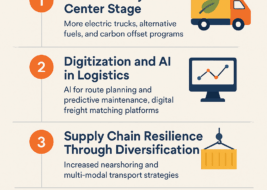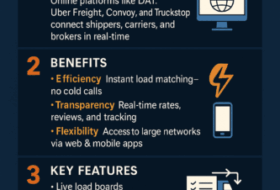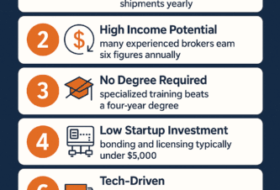Are you passionate about the transportation industry? Do you have an entrepreneurial spirit and a knack for connecting people? Starting a freight brokerage business might be the perfect venture for you. As a freight broker, you act as an intermediary between shippers and carriers, facilitating the smooth movement of goods from point A to point B.
Before delving into the intricacies of the freight brokerage business, let’s start with the fundamentals. Understanding the core components will set the stage for your journey towards success.
Starting a freight brokerage business offers numerous advantages. It allows you to enter the thriving transportation industry without the need for substantial capital investment. Additionally, you have the opportunity to build strong relationships with both shippers and carriers, earning their trust and loyalty.
Essential Skills and Qualities
To excel in the freight brokerage business, certain skills and qualities are indispensable. While some can be developed over time, others are innate and contribute to your success right from the start.
- Excellent Communication: As a freight broker, you’ll interact with shippers, carriers, and other stakeholders regularly. Clear and effective communication is crucial for building strong relationships and ensuring smooth operations.
- Negotiation Expertise: Negotiating rates and contracts is a vital aspect of the freight brokerage business. Mastering negotiation skills will help you secure favorable deals for both shippers and carriers.
- Attention to Detail: Paying close attention to details is imperative to ensure accurate documentation, track shipments, and resolve any issues that may arise.
- Problem-Solving Abilities: The transportation industry can be unpredictable, and challenges are bound to occur. Being a resourceful problem-solver will enable you to overcome obstacles swiftly and keep operations running smoothly.
Steps to Start a Freight Brokerage Business
Step 1: Research and Planning
Embark on your journey by conducting thorough research. Familiarize yourself with the industry, its regulations, market trends, and competitors. Create a comprehensive business plan outlining your goals, target market, and strategies for growth.
Step 2: Legal Requirements and Licensing
To operate as a freight broker, you need to fulfill specific legal requirements and obtain the necessary licenses and permits. Consult with local authorities and regulatory bodies to ensure compliance.
Step 3: Establishing Your Business Entity
Decide on the legal structure of your business, such as a sole proprietorship, partnership, or limited liability company (LLC). Register your business name and obtain the required tax identification numbers.
Step 4: Setting Up Your Office
Create a professional and functional office space equipped with essential tools and technologies. Invest in a reliable computer, high-speed internet connection, transportation management software, and communication systems.
Step 5: Building Relationships with Shippers and Carriers
Success in the freight brokerage business heavily relies on your ability to establish strong relationships with shippers and carriers. Network extensively, attend industry events, and leverage online platforms to connect with potential clients.
Step 6: Marketing and Branding
Develop a compelling brand identity and create a marketing strategy to promote your brokerage. Utilize digital marketing techniques, including search engine optimization (SEO), social media marketing, and content creation, to enhance your visibility and attract customers.
Step 7: Managing Operations and Finances
Implement efficient systems and processes to manage your brokerage’s operations effectively. This includes load booking, dispatching, tracking, and invoicing. Additionally, establish a robust financial management system to track revenue, expenses, and profitability.
Step 8: Continuous Learning and Adaptation
The transportation industry is dynamic, and staying ahead requires continuous learning and adaptation. Stay updated with the latest trends, regulations, and technological advancements to remain competitive and offer exceptional service to your clients.
FAQs
- Q: How much capital do I need to start? A: The capital required to start a freight brokerage business can vary. While some brokers start with as little as $5,000, having access to a higher capital amount, such as $20,000 to $50,000, allows for greater flexibility and faster growth.
- Q: Do I need prior experience in the transportation industry? A: While prior experience in the transportation industry can be advantageous, it is not a prerequisite. With dedication, industry research, and the right training, you can acquire the necessary knowledge and skills to succeed.
- Q: How do freight brokers find shippers? A: Freight brokers find shippers through various means, including networking, attending industry events, utilizing online load boards, and establishing partnerships with manufacturers and distributors.
- Q: What are the risks? A: The freight brokerage business carries certain risks, such as market fluctuations, liability for lost or damaged goods, and the potential for non-payment by shippers. Mitigate these risks by obtaining appropriate insurance coverage and maintaining strong relationships with reliable carriers and shippers.
- Q: Can I start a freight brokerage business from home? A: Yes, starting your business from home is possible. However, ensure you have a dedicated workspace, reliable communication systems, and the necessary technological infrastructure to support your operations.
- Q: How long does it take to make a profit? A: The time it takes to make a profit in the freight brokerage business varies. It depends on factors such as your market, competition, marketing strategies, and your ability to build a solid client base. On average, it can take anywhere from six months to two years to achieve profitability.
Starting a freight brokerage business can be a fulfilling and lucrative venture for those with a passion for the transportation industry. By following the steps outlined in this guide, you’ll be well-equipped to navigate the complexities of the industry and build a successful brokerage. Remember, continuous learning, adaptability, and strong relationships are the keys to long-term growth and profitability.
Growth + Change = Opportunity! How are you going to capitalize on the opportunity as a freight broker, agent, dispatcher or box truck carrier?








